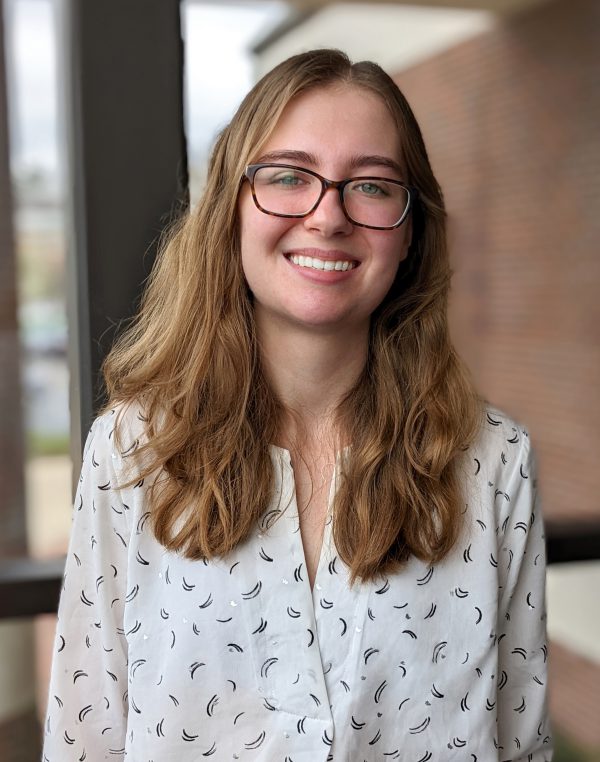
Science Foundation as a Graduate Research
Fellow to support her graduate career at the
University of Michigan.
Ola Bartolik ’22 has been selected by the National Science Foundation (NSF) as a Graduate Research Fellow to support her graduate career at the University of Michigan.
Bartolik will graduate from Kalamazoo College in June with a bachelor’s degree in chemistry with a biochemistry concentration and a psychology minor. In August, she will begin a Ph.D. program at the University of Michigan, where she previously participated in research in the lab of Paul Jenkins for her Senior Integrated Project.
The National Science Foundation Graduate Research Fellowship Program (NSF GRFP) recognizes and supports outstanding graduate students in STEM disciplines who are pursuing research-based master’s and doctoral degrees at accredited U.S. institutions. The five-year fellowship includes three years of financial support, including an annual stipend of $34,000 and a cost of education allowance of $12,000 to the institution. The fellowship also provides access to opportunities for professional development.
Approximately 2,000 applicants are offered a fellowship from among more than 12,000 applicants per competition.
“I think it’s really important that students at K be aware of the fellowship,” Bartolik said. Bartolik said the application process offered experience in writing a research proposal and bolstered her grad school applications by showing she was already thinking about funding and research. While Bartolik had considered taking a gap year before entering graduate school, the combination of the fellowship offer with the community she has already found at the University of Michigan while working on her SIP proved irresistible.
“I was having a lot of doubt as to whether I could really put myself through a Ph.D. or whether I had the skills and the knowledge to do it,” Bartolik said. “If the National Science Foundation saw enough potential to invest in me, that makes me think I’m ready for grad school.
“When I posted the announcement on my academic Twitter, Paul Jenkins retweeted it, and the University of Michigan neuroscience program retweeted it, too. The head of the program emailed me that I should be really proud. I hadn’t even committed to graduate school yet and they were already celebrating with me.”
Bartolik was also quick to share the news with the chemistry department at K.
“We are very proud of Ola,” said Blakely Tresca, Roger F. and Harriet G. Varney Assistant Professor in the Department of Chemistry and Biochemistry. “This is an amazing accomplishment for an undergraduate student before starting a Ph.D. program. Ola is the first chemistry major in 25 years to earn this honor while still a student at K.”
Bartolik will earn her Ph.D. as part of the Program in Biomedical Sciences (PIBS) at the University of Michigan, an umbrella program that comprises a variety of research fields including neuroscience, pharmacology, biochemistry and more.
“I’m really interested in trying to combine either neuroscience and pharmacology, or neuroscience and chemistry, for designing new drugs or new molecules that could be used for research or for therapeutic purposes,” Bartolik said. “My goal has always been to combine chemistry with neuroscience because I like chemistry; I don’t want to let go of it. Neuroscience can be very bio-heavy and I feel like having a chemist’s perspective on biological systems like the brain is really valuable.”
While her graduate work in PIBS is funded, Bartolik said, research opportunities can be limited based on each lab’s available funding.
“The fellowship opens me up to more lab opportunities and makes it easier to secure a spot in a lab,” Bartolik said.
At this point, Bartolik is interested in possible careers with a pharmaceutical or biomedical company as well as the field of science communication.
“Something that’s been interesting to me more and more is science communication, and how to effectively communicate science to people who don’t have the background,” Bartolik said. “The SIP was good practice; even though it was to a chemistry major audience, I still had to explain how neurons work and why this research is important. I found that I like presenting; I don’t get as nervous as I used to. And I like to geek out about my work around neuroscience, so I think that’s something I want to explore more, opportunities in journalism or some sort of science communication.”
In addition to the professional affirmation and practical benefits, the award is personally meaningful to Bartolik.
“My father passed away in 2017 from a heart attack,” Bartolik said. “He always supported me in high school, in everything I did. And I feel like he would have been so proud of me. I felt him with me, celebrating. My parents left everything behind in Poland so my sisters and I could have a better life and more opportunities. I feel like I’m fulfilling that and trying to make the most out of the life I’ve been given.
“I feel like this is what I was meant to do.”
NSF has funded Graduate Research Fellowships since 1952. More than 70 percent of fellows complete their doctorates within 11 years, 42 fellows have gone on to become Nobel laureates, and more than 450 have become members of the National Academy of Sciences. Applications are generally due in October. For more information, visit the National Science Foundation website.

